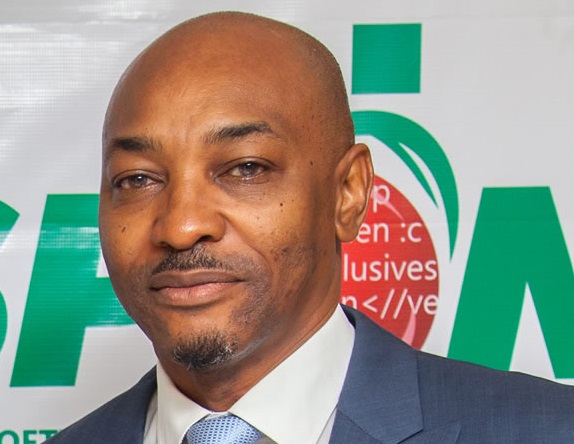Telecom
Mba-Uzoukwu, ISPON President Decries 30% Utilisation Rate of 11 Datacenters in Nigeria

Mr. Chinenye Mba-Uzoukwu, president, Institute of Software Practitioners Association of Nigeria (ISPON) has decried the under utilisation of the 11 data centres in Nigeria, putting the current utilisation rate at below 30%.

He noted that the low adoption indicated that despite the forecasted growth in installed capacity, the patronage by way of utilisation does not match the expected levels.
He made this known while speaking at a Technology Forum organized by the Nigerian Information Technology Reporters Association (NITRA) in Lagos, with the theme: “Achieving 30% Growth In Local Cloud Hosting By 2024”.
According to Mba-Uzoukwu, “we are faced with a puzzling question: the housing estates that our friends are building against all odds in a super-challenging environment, will they be occupied by offshore tenants or ourselves?”
“There are 11 datacenters in Nigeria and the largest are expanding their capacity constantly in anticipation of a growing demand but currently the utilisation of capacity probably sits at below 30%.
“With four certified Tier 3 Constructed Facilities in Nigeria and more on the way, the Africa datacenter market is expected to cross $3bn by 2025, growing at a CAGR over 12%.
“This indicates that despite the forecasted growth in installed capacity, the patronage by way of utilisation does not match the expected levels”.
Unformed report also indicates that Galaxy Backbone Limited which is the only Uptime Institute Certified Tier 3 Datacenter in the public sector (in Nigeria) is currently estimated at 38% capacity utilisation of its 2.5MW capacity.
To this end, the President of ISPON said, “We must ask why”.
“The 2020 GSMA report highlights that availability of internet services has not translated to adoption while there is no established correlation between broadband availability and indicators of innovation such as hubs and software companies e.g. Aba, Enugu, Calabar, Benin and Jos have limited broadband and predominantly 2.5G/3G networks yet host significant innovation activity.
“ISPON’s research indicates that this puzzling scenario is directly related to local software – local in the sense of being developed by Nigerians for Nigerians to solve Nigerian problems.
“While we have seen phenomenal growth in the fintech space, the vector and velocity for the evolution of Software Nigeria as a whole remains constrained by the extent to which the Digital Economy which is emerging is anchored on local innovation and local utilisation.
“The datacenters performance is driven by users are large corporates and MNCs for whom data services are not taken lightly as they commit to long-term relationships on the basis of reliability especially High Availability which is indexed to global standards. In this context, Digital Transformation, especially in the public sector is critical pre-requisite.
“Digital Transformation delivers joined-up government that enables the policy and process of governance to ride on top of IT infrastructure from broadband to software solution stacks. It also presents opportunities for entrepreneurship and innovation to flourish as solution providers get work to do. For this dynamic to be accelerated and proliferated, it is difficult to over-estimate or emphasise the importance of the Local Cloud which must be the initial point of access for a broad-based digital adoption and transformation strategy in a rising tide that lifts all.
“We often fail to recognise and prioritize this fundamental – perhaps it is an inconvenient truth?
“There is much to unpack in this but it will suffice to say that ISPON believes that the Software Nigeria and Data Nigeria are conjoined twins – separating the two is not only difficult but in this case, it is foolhardy because what we share is vital to the survival of each twin. Let us therefore proceed with this in mind!”
He also applauded NITRA for hosting the event, adding that ISPON sees the Association as an integral component of the technology ecosystem as partners as well as practitioners whose largely unsung efforts have been pivotal to the emergence of the industry we celebrate today as Africa’s most vibrant and fastest evolving technology ecosystem.
“ISPON celebrates you, one and all!
“We are therefore extremely pleased to be a part of this celebration and the discussions that follow will be one more block laid by NITRA in the tremendous role being played by your Association and members in the growth of the Digital Economy.
“We thank you for what you do and once again, give our assurances of a continued partnership.
Chike Onwuegbuchi, Chairman of Nigeria Information Technology Reporters’ Association (NITRA), said that the theme was carefully selected to enable stakeholders in the information and Communications Technology to discuss issues that will bring growth and development to the sector.
“This edition”, he said, “we are looking at local cloud hosting a very important aspect of technological development.
“Cloud computing has been described as the greatest game changer since the creation of the internet and is one of the fastest growing areas of technology today. It can be simply defined as renting time on a computing infrastructure over the internet, rather than building your own from the ground up. In a way, it could be described as outsourcing your computer infrastructure.
“Cloud computing offers scalability and reliability that cannot be matched by a single enterprise.
“Today, we are talking of data protection. How can you protect data that is warehoused outside of our shores?
“Local cloud hosting also helps to keep our local internet traffic local as local content providers host their content in-country.
He also recalled that NITDA in 2019 launched Nigeria’s Cloud computing policy and one of the goals of this Policy is to ensure a 30% increase in adoption of cloud computing by 2024 among Federal Public Institutions (FPIs) and SMEs that provide digital-enabled services to the government.
“The policy also targets 35% growth in cloud computing investments by 2024. It is on this that we selected the theme of today’s event.
“When we are talking about local cloud hosting we can’t achieve it if we don’t patronize local datacenters; this informed the presences of datacentre operators in this discourse.
The Forum attracted industry stakeholders including corporate organisations; Nigeria Internet Registration Association (NiRA); Internet Exchange Point of Nigeria (IXPN); Cloudflex; Layer3; Vintage Confluence LLC and industry associations – ISPON, ALTON, ATCON, NCS, amongst others.
Telecom
NCC Asks Consumers to Monitor Data Usage to Authenticate Consumption

Nigerian Communications Commission (NCC) has charged the over 174 million telecoms subscribers in the country to constantly monitor their data usage to authenticate their consumption level.

This follows concerns being raised by telecoms consumers about the rapidity of data depletion on their devices.
The Commission particularly enjoined the consumers to always contact their service providers to make requests for cases of discrepancies noted in their data usage.
While the consumers are expected to contact their service providers to request for their usage history/statement where inconsistency exists in their data usage as first step, the Commission said they may also escalate such issues to the Commission through its toll-free Number 622 and social media platforms, especially if their requests are not satisfactorily handled.
The Commission, which also made some clarifications regarding the concerns being raised by the consumers around data usage, said the need to inform the consumers on their concerns is part of its commitment to protect and appropriately inform and educate the telecom consumer on industry issues.
Making further clarifications around data speed and usage, the Commission said data speed is the speed at which data is transferred between two devices, measured in megabits per second (Mbps or mbps), stressing that given the spread of Internet services and the immense investment in the sector, data rates have continued to increase and users may be unaware of how to measure data speed.
The telecoms regulator explained further that websites such as www.fast.com also provide an easy way for consumers to measure Internet speed on any device at any location.
“The higher the data speed, the quicker pages load-downloads and uploads-occur and expectedly, the quicker data bundles are exhausted. So, as telecom consumers are able to do more on devices in less time, some consumers’ devices & network service providers make it possible to limit data speed to help users manage data usage better.
“In any case, most devices now include functions to measure data used by devices and it is imperative that users monitor same to authenticate data usage, such as applications left running on devices. Therefore, where discrepancies occur users may contact their service provider to request for their usage history/statement. If request is not dealt with satisfactorily then, users can contact NCC by calling 622 or engage the Commission via its social media platforms”.
It added that the data usage experience is a function of location, network equipment and users connected in a particular location.
Telecom
Phone Theft: AMCODET Urges Mandatory Registration @ Point of Purchase

Association of Mobile Communication Device Technicians of Nigeria (AMCODET), has called on the Nigerian Communications Commission (NCC) to make it mandatory for mobile phones to be registered at the point of purchase.

According to Kehinde Apara, president of AMCODET, implementing this registration process would significantly help in combating phone theft and assist in locating stolen devices.
Apara, made this appeal in an interview in Lagos on Monday.
He stated, “Registration of mobile phones will reduce theft to the barest minimum, as it will be difficult for thieves to sell registered stolen phones.”
Apara explained that the registration of new phones would also help to reduce the harassment faced by technicians by security agencies.
“So many of our members have been labelled accomplices in theft cases, because customers bring stolen phones to them to repair. We believe this is unfair to such innocent people,” he said.
He went on to highlight that the NIN-SIM linkage, which was originally an idea brought forward by AMCODET, was created to curb insecurity and theft.
However, Apara pointed out that “It is not enough.”
He stressed the need for further measures to ensure the proper registration of mobile phones, emphasising that such a step would make it easier for technicians to identify stolen devices brought in for repair or flashing.
“AMCODET has been at the forefront of organising seminars on the security of mobile phones and has also been sensitising the public and authorities on the challenges faced by the association due to phone theft. There is no way our members can identify if a phone is stolen when brought to them for repairs or flashing, but if the phone is registered, the technician can more easily identify it,” he explained.
Apara also expressed a desire for closer collaboration with security agencies, saying, “We want to work with security agencies to ensure that phones are properly registered, theft is prevented, and thieves are brought to book.”
In additin to the call for phone registration, Apara appealed to individuals and the private sector to support efforts to develop the mobile phone industry in Nigeria.
He remarked, “We need individuals’ support to develop our industry, rather than relying on government for everything.”
He emphasised that Nigeria has the capacity to develop its own technology and reduce reliance on imported devices, “With the support of individuals and the private sector, Nigerians can begin to develop its own technology, rather than relying on imported technology.”
Apara expressed optimism for the future of the mobile phone industry in Nigeria, believing that with the right support, the country could build its own technological solutions and move towards greater self-reliance.
“We can develop our own technology.”
“But we need the support of individuals and organisations to make it happen,” he said.
Credit: NAN
Telecom
Apple Faces €150M Fine in France Over Alleged Antitrust Violations

French antitrust regulators have fined Apple 150 million euros ($162 million) over its App Tracking Transparency (ATT) feature, which is facing scrutiny in multiple European countries.

The French Competition Authority ruled that Apple’s implementation of ATT was “neither necessary nor proportionate to the company’s stated goal to protect user data” and unfairly penalized third-party publishers.
Alongside the financial penalty, Apple has been ordered to publish the decision on its website for seven days. The ruling comes amid ongoing investigations in Germany, Italy, Romania, and Poland into ATT, which Apple introduced in 2021 as a privacy safeguard.
ATT requires apps to obtain explicit user consent via a pop-up before tracking activity across other apps and websites. If users decline, the app loses access to their advertising identifier, limiting targeted advertising. Critics argue that the system disproportionately benefits Apple by restricting competitors while promoting its own advertising services.
The French watchdog found that ATT forces users to navigate excessive consent windows for third-party apps on iPhones and iPads, making the process unnecessarily complicated.
Additionally, Apple’s system requires users to opt out of ad tracking twice rather than once, which the authority said undermines the feature’s neutrality and causes economic harm to app publishers and ad service providers.
The ruling emphasized that smaller publishers, which rely heavily on third-party data collection for revenue, are particularly affected.
The French regulator initially declined to impose emergency measures in 2021 after complaints from the advertising industry, but continued its investigation, ultimately leading to Monday’s decision.

 Telecom2 days ago
Telecom2 days agoMTN, Lynk Global Make Africa’s First Satellite-to-Mobile Call

 E-Business2 days ago
E-Business2 days agoSystemSpecs’s Subsidiary Deelaa Becomes Whatadeal

 E-Financial2 days ago
E-Financial2 days agoNigeria Gets Fresh $500m World Bank Loan for Economic Stimulus Programme

 General News2 days ago
General News2 days agoSERAP Asks National Assembly to Drop Bill to Jail Nigerians who Fail to Vote

 E-Financial2 days ago
E-Financial2 days agoUninsured Depositors of Heritage Bank to Receive Liquidation Dividends In April – NDIC

 Telecom2 days ago
Telecom2 days agoSmart Treasure Investment Team’s Initiatives Eradicate Poverty, Says Aminu

 E-Business2 days ago
E-Business2 days agoCybersecurity Firm Says It’s Time to Back it Up, As the World Marks World Backup Day

 Telecom2 days ago
Telecom2 days ago15-Year-Old Autistic Artist, Kanye, to Unveil World’s Largest Art Canvas on Autism Awareness Day


























